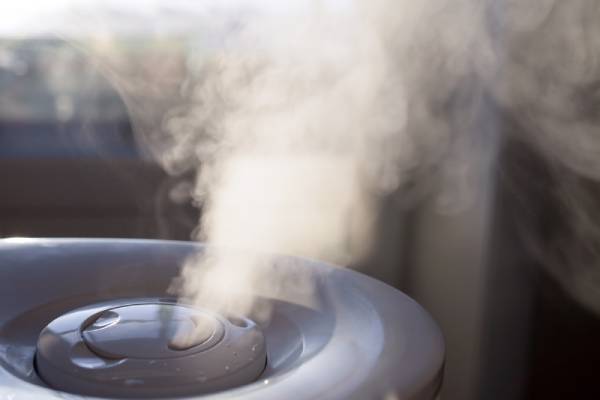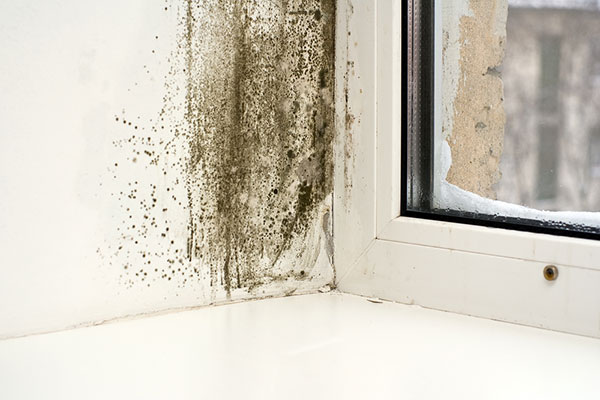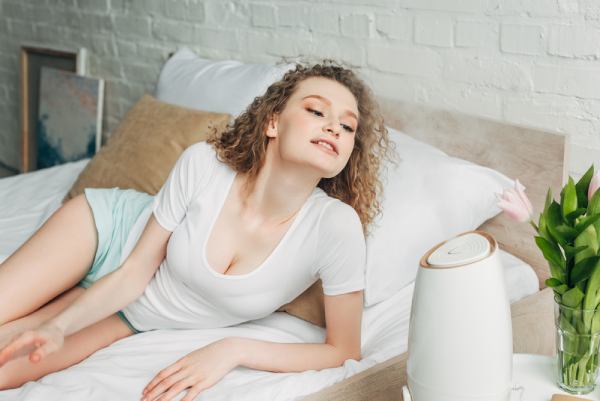Most people in the UK are familiar with dehumidifiers and their benefits in removing excess moisture from the air to combat condensation, dampness and mould growth. But many Brits are not quite so familiar with humidifiers or how they can help alleviate some cold-weather-related health issues.
While dehumidifiers work to remove excess moisture from the air, humidifiers work to add moisture to dry air. But what does that mean, exactly? Well, for a start, there are health benefits to having just the right level of moisture in the air and adding moisture to dry, frigid air can help alleviate issues such as dry, itchy skin and chapped lips.
At the most basic level, humidifiers enrich the air with water vapour, which has been shown to help people with dry skin conditions, nose bleeds, and breathing issues and has even been shown to help reduce snoring in some people.
When should you use a humidifier?
You can use a humidifier to add more moisture to the atmosphere to help relieve unwanted health symptoms exacerbated by dry air. People that tend to benefit most from increasing the humidity of their air are those with asthma or other breathing issues and those with dry skin conditions such as eczema or dry, chapped lips.
Many people use humidifiers in their bedrooms at night to help them get more restful sleep. Running a humidifier can help to keep your airways moist and allow you to breathe more easily. Many people with asthma, lung diseases and allergies to dust, pollen and dust mites often have broken sleep due to coughing fits triggered by overly dry airways and breathing in allergens that can be reduced by maintaining good air humidity levels in the bedroom.
The importance of maintaining correct humidity levels
The UK is a temperate country with primarily warm and damp weather. This means many British homeowners can struggle with condensation issues caused by high humidity levels in their homes. But while running a dehumidifier in the house is a good thing to remove excess moisture from the air, it is possible to overdo it and create an indoor atmosphere that is too dry to be good for our health.
According to Environmental Protection UK, the ideal indoor humidity levels for your living space should be between 30 to 50%. If you don’t have an air quality tester, then you should look for signs of over or under-humidification.
Signs of over-humidification include:
- Increased condensation on windows
- Mould and mildew growth
- Cloths and soft furnishings feel and smell damp
Signs of under-humidification include:
- Dry, itchy skin
- Chapped lips
- Nose bleeds
- Nasal congestion
- Dry eyes
- Worsening of any health conditions such as asthma or sinusitis
Humidifier benefits for asthma and allergies
The indoor humidity level is critical for anyone with asthma or other breathing-related health conditions. This is affected by outdoor weather conditions and air temperature. During the colder months of winter, your indoor air may be dry, and if you are running central heating or other indoor heating, this can add to the dryness of the air.
Running a humidifier can help to add moisture to your indoor air to maintain just the right amount of indoor humidity to benefit your health. If your indoor air is too dry and adversely affects your respiratory system or your ability to breathe comfortably, adding a humidifier to your home may be incredibly beneficial.
Cleaning and maintenance of home humidifiers
When looking for a good-quality humidifier to purchase for your home, ensure you buy one that best suits your needs and only run it when you need it. Overusing a humidifier and failing to keep it clean and in good working order can worsen some health conditions, such as asthma.
Your humidifier will also work more efficiently when cleaned regularly and properly. Leaving it too long between cleaning can cause the humidifier to harbour fungi and bacteria, which will then be released into the air to cause irritation and trigger asthma attacks.
It is also safer to clean your humidifier with natural products that don’t contain bleach or cleaning chemicals that may be irritating to the respiratory system. Regular cleaning with diluted white vinegar and tea tree oil can eliminate bacteria and fungal growth and keep your humidifier in good working order.
Home Humidifier FAQs:
Is Sleeping with a humidifier good for you?
The short answer is yes. Sleeping with a humidifier can be beneficial for your health, especially when you are sick with a cold or flu, as it provides a comfortable level of humidity for rest, sleep and recuperation.
Is a humidifier good for your lungs?
Humidifiers can ease respiratory problems, allergies, and general breathing discomfort by keeping breathing passageways moist and feeding more oxygen to the lungs.
Is it OK to use a humidifier daily?
It is OK to use a humidifier daily, but you also want to ensure that your humidifier does not make your home too humid. Using a humidifier to help maintain ideal humidity levels is the key to keeping indoor air quality high.
What are the negatives of a humidifier?
The only time running a humidifier may be bad is when your indoor air is already carrying too much excess moisture. Adding even more water to the atmosphere can increase condensation buildup, leading to mould and mildew growth, which can worsen health conditions such as asthma.
Can I use tap water in my humidifier?
It is perfectly safe to use tap water in your humidifier. While there are plenty of complementary products on the market, such as water purification tablets that can be added to the water tank, it is OK to use tap water on its own. Water does not need to be distilled or purified for it to be safely added to your home humidifier.
Do I need a humidifier in winter?
Humidifiers are ideal to use during winter. Winter weather is well known for causing dry skin and chapped lips from cold, dry air. Many people are left with itchy, flaky, dry skin in the winter, which isn’t a problem during warmer weather. Indoor heating can also cause skin dryness that no amount of skin creams or lotions can eliminate. One of the best ways to relieve dry skin, winter colds and flu and allergy symptoms is to use a humidifier during winter.
Where is the best place to put the humidifier?
It is recommended to place your humidifier several feet away from your bed for general use, but closer is fine if you are using it to help you get over a cold or flu. Although you can place them on the floor, elevating the device by a foot or two can help to improve air circulation. Avoid positioning the humidifier in direct sunlight, and be careful when sitting them on wood surfaces, as the mist may cause water damage.





